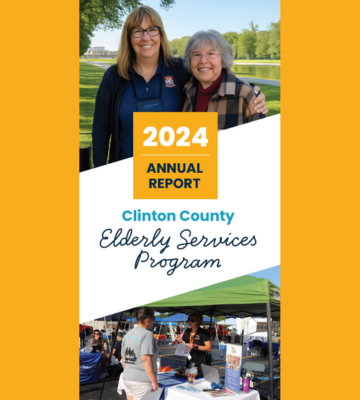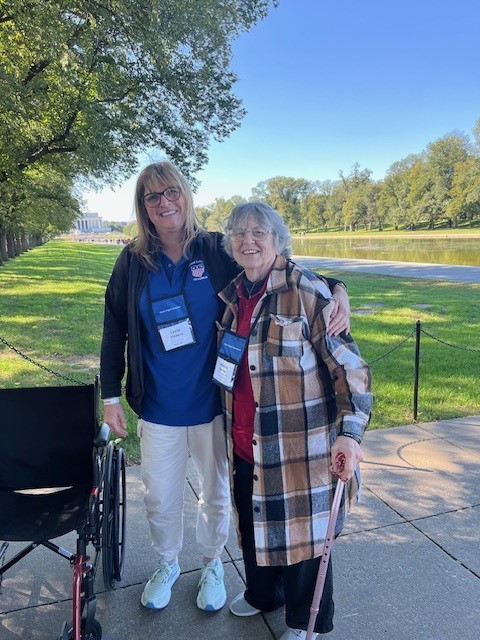Clinton County Elderly Services Program 2024 Annual Report
Below are the full success and client stories from the Clinton County Elderly Services Program (ESP) 2024 Annual Report. These stories illustrate the impact ESP has on older adults and caregivers in Clinton County.
Click here to view the program’s 2024 annual report. To request a paper copy, email us.
- Army veteran enjoys continued independence thanks to Clinton County home modification program
- No-cost home modifications help Wilmington widow safely navigate her home
- Healthy Aging grant improves lives for Clinton County older adults
- Competitive bidding yields big savings for ESP
- COA-backed rule change benefits home-delivered meals clients; cuts expenses
- COA service project restocks senior building community rooms
- Levy funds improvements at two county senior centers

Army veteran enjoys continued independence thanks to Clinton County home modification program
As a former member of the U.S. Army and an Army spouse, Emeline has lived all over the country, and in Japan. But she now calls Sabina home. She moved there in 2020 from Kalamazoo, MI to be close to several of her four children, one of whom lives in Clarksville.

Emeline became a widow in 2013 when her husband, Tom, passed away, so she lives in her home alone. Despite its one-story floor plan, there were plenty of places that were hazardous to a person with a high risk of falling. A former marathon runner, Emeline has had both of her knees and hips replaced. In 2022, she fell and broke her femur. She now uses a walker full-time to help her get around safely.
Emeline was already receiving services through the Clinton County Elderly Services Program (ESP), which Council on Aging (COA) administers. Home-delivered meals, assistance from a home health aide and durable medical equipment had helped her remain independent since she became a client in 2020.
But, according to her ESP care manager Haley, “As Emeline ages and her complex medical conditions progress or exacerbate, certain aspects of her home were making it more difficult to stay safe and independent. Her front steps were becoming more challenging, and she didn’t have sufficient lighting in the home.”
While ESP provides minor home repairs and modifications to eligible clients, funding was limited. Recognizing there was more need in the county than ESP could address, COA applied for and received a $1.25 million grant through the U.S. Department of Housing and Urban Development’s Older Adults Home Modification Program.
Through the grant, COA provides no-cost home modifications to county residents who are 62 and older, own their home and its land and meet income guidelines. It provides a dedicated stream of funding, saving money for the county and its taxpayers, and ultimately helping more Clinton County older adults to remain in their homes as long as possible, where most would prefer to be.
Recognizing how the right home modifications could make her home a safer place to live, Haley encouraged Emeline to apply for the program.
Emeline qualified to receive grab bars in several areas of her house, a raised toilet seat with handrails, a light replacement and a ramp to her front door. “I tell you what, the ramp’s made my life easier. Before, I had a step out there and I’d miss the step and fall into the yard,” she said. “With the ramp I haven’t fallen at all.”
Maintaining her independence is important to Emeline. Even when she was younger, she was an advocate of helping older adults to remain in their homes as long as possible. “Putting all these things in, it actually makes you feel emotionally better. I have more independence,” she said.
Emeline believes more older adults in Clinton County should apply for the program. “I would say, if they offer to do it, go for it. It makes your life a whole lot safer and a whole lot easier.”
Council on Aging is currently accepting applications for the Clinton County Older Adults Home Modification Program. For more information, visit www.help4seniors.org/cchomemods or call (937) 584-7200, menu option 2.
No-cost home modifications help Wilmington widow safely navigate her home
Sharon is a long-time Wilmington resident who enjoys spending time with her children and granddaughters and participating in activities offered by her local senior center.

At 80 years old, she appreciates being able to live in the condo she and her husband Roger purchased in 2007 after his congestive heart failure made it difficult to maintain their home. Roger passed away in 2015.
Although Sharon’s condo is one level and she doesn’t have to navigate stairs, other hazards became a concern as she grew older, and her legs weakened. It gradually became more difficult for her to stand up from a seated position. She also is unsteady at times from what she believes is an inner ear issue and has a tendency to run into walls. “I’ve always walked a bit sideways,” she said.
Sharon’s daughter told her about the Clinton County Older Adults Home Modification Program, which provides no-cost home modifications to county residents who are 62 and older, own their home and its land and meet income guidelines.
The modifications are intended to help program participants to age in place as long as possible. The program is funded by a grant awarded to Council on Aging (COA) by the United States Department of Housing and Urban Development. Seventy home modification jobs have been completed for eligible Clinton County homeowners to date.
An occupational therapist (OT) visited Sharon in her condo to evaluate her environment and her physical needs. The OT recommended safety modifications to Sharon’s two bathrooms, including grab bars to assist her with shower access and raised toilet chairs with arms to help her stand up. “I was using the counter, but that got slippery,” she said.
A COA-approved, local provider installed these items, as well as a handle at her front door to help her more easily and safely enter her condo.
Sharon feels more self-sufficient since her modifications were installed and said, “I’d tell others that the program really helps, and we seniors need all the help we can get. I’d recommend it to anybody.”
“Sometimes we seniors don’t really realize who to go to for things like this,” she said.
The Clinton County Older Adult Home Modification Program is currently enrolling county residents who qualify. For details and to apply, visit www.help4seniors.org/cchomemods or call (937) 584-7200.
Healthy Aging grant improves lives for Clinton County older adults
In 2023, Clinton County commissioners received a $220,066 Healthy Aging grant from the Ohio Department of Aging. The grants were intended to support the creation of new programs or bolster existing programs that focus on delivering services and supports that keep at-risk aging Ohioans in their homes and communities for as long as possible.
The grants were one-time allocations funded by ARPA and were required to be spent by Sept. 30, 2024. More than $40 million in Healthy Aging grant funding was awarded across Ohio’s 88 counties.
Counties were required to allocate a portion of the funding to food and housing assistance and internet access and digital literacy services. The remaining funds could be used to provide evidence-based services which aligned with Ohio’s 2023-2026 State Plan on Aging.
As the Area Agency on Aging for Clinton County and the county’s partner in administering the local senior services tax levy, Council on Aging (COA) worked with the ESP Advisory Council to make recommendations to county commissioners on how to use the grant dollars to address some of the most urgent, unmet needs of older adults in Clinton County.
County Commissioners collaborated with COA to use funds for essential services for older adults in 2024. COA successfully delivered the services supported by the grant, serving nearly 600 individuals.
Citing the end of pandemic relief funding, high inflation and the rising demand for home and community-based services, COA’s Vice President of Program Operations, Ken Wilson, said that the Healthy Aging grant funding arrived at a critical time.
“The Healthy Aging Grants provided an opportunity to take some pressure off local senior services tax levies and the Elderly Services Programs that they fund,” Wilson said. “This funding – although not permanent, helped us meet critical community needs and avoid waiting lists for services.”
One key outcome of the funding in Clinton County was the creation of digital literacy classes and a technology learning lab for adults age 60+. The classes and lab were developed and coordinated by Clinton County Community Action Agency – a key service provider in the county – and some of the instructors were students from Wilmington High School. More than 80 older adults improved their technology skills through the program.
Gail, a member at the Aging Up Center and a participant in the senior technology class, said, “I feel a lot more comfortable with my cell phone now. While I don’t know how to do fancy things on it, I can do what I need to do now.”
“When we first started the classes, we planned to cover a lot of different areas of technology, but ended up mostly covering cell phones,” said Shane Breckel, senior services director at the Aging Up Center. “We found our participants have realized that cell phones have become an integral part of daily life, and they wanted to become more proficient and comfortable with them. We feel the classes helped them to get there.”
The grant also:
- Provided food assistance via home-delivered meals program to 404 older adults
- Provided home modifications and one-time utility assistance to support or sustain independent living for 78 eligible older adults. The most common home modifications included grab bars for bathrooms and ramps to provide easier access in and out of the home. Eligible older adults received a one-time credit of $500 towards gas and electric bills.
- Helped 14 older adults access services including emergency response services and medical transportation through their Medicare Advantage Plans.
“These grants helped us serve more vulnerable older adults, without placing additional strain on county senior services tax levies,” Wilson said. “We were able to provide critical services that met the aim of the grant’s purpose – to help older adults live safely and independently in their homes and communities. The grants also strengthened our relationship with local leaders and key service provider partners in the county.”
All Healthy Aging grants funds were spent by the Sept. 30, 2024 deadline.
Competitive bidding yields big savings for Elderly Services Program
As ESP’s administrator, COA contracts with service providers to deliver services to clients. Contracts are awarded through a competitive bidding process. As with all COA services, the goal is to contract with the highest quality providers at the lowest possible price to serve as many clients as possible with the tax dollars available.
In 2024, COA issued a Request for Proposals (RFP) for Electronic Monitoring Systems (EMS). More than the traditional “lifeline” device, EMS is a flexible service that meets a variety of needs, including medication dispensers, smoke and carbon monoxide detectors, Alzheimer’s boundary alarms and GPS tracking devices, among others. It is a popular service within ESP – more than 300 enrolled individuals used the service in 2024.
EMS providers offer similar services, often utilize identical hardware and have very scalable cost structures. With that in mind, COA sought a volume discount (across four counties) with a high-quality provider via a five-year contract. Since 2015, the previous single-sourced contract has saved nearly $5 million for senior services levies in Butler, Clinton, Clinton and Warren counties.
In the case of the 2024 EMS RFP, COA anticipates the new five-year contract with Guardian Medical Monitoring will save an additional $1.5 million (20% reduction in previous contract costs), which amounts to $105,137 in savings for Clinton County ESP. The new monthly service rate for EMS is $19 – a rate that is 42% lower than the Medicaid rate for the same service.
COA-backed rule change benefits home-delivered meals clients; cuts expenses
As the Area Agency on Aging for southwestern Ohio, Council on Aging (COA) advocates on behalf of older adults and the provider network that serves them. In 2024, COA advocated for changes to a rule that reduced costs, eliminated regulatory burden and eased service access for clients.
Due to COA’s persistence, the change came about in 2024 after more than 10 years of work. In 2011, COA, other organizations and service providers began advocating with the Ohio Department of Aging (ODA) to loosen or remove the “diet order” in Ohio’s administrative code for clients receiving therapeutic home-delivered meals. Therapeutic meals follow specific nutritional guidelines for those who require a certain diet for health conditions, or are mechanically altered (chopped, mashed, etc.) for safe chewing and swallowing.
The diet order required a prescription from a physician for a client to receive therapeutic meals. “The requirement imposed a huge burden on home-delivered meal providers and COA’s care management staff,” said Ken Wilson, COA’s vice president of program operations, who was instrumental in advocating for the rule change. Additionally, “other states didn’t have the requirement,” he said.
COA submitted a formal proposal for a change in 2019, but it received no traction. Then, COA Government Relations Director Nan Cahall suggested making the case for a rule change through Ohio’s Common Sense Initiative (CSI), which reviews state agency regulations as potential obstacles to business.
COA partnered with home-delivered meals provider Meals on Wheels of Southwest OH & Northern KY to make its case: that the rule required a tremendous amount of unnecessary time and resources to obtain prescriptions from physicians who were generally not equipped to provide them quickly. And most importantly, it delayed older adults receiving the appropriate meals.
CSI investigated and met with ODA and the Ohio Department of Medicaid to advocate for the rule change. In 2024, the rule was successfully amended to allow flexibility in the prescription requirement.
“The change not only allows more personal choice and autonomy for older adults but is helping us achieve our main goal: to ensure the health and safety of our clients by providing the correct meal without unnecessary delays,” Cahall said.
COA and providers are also saving money as a result of the rule change. “This change contributed to a 12% reduction in home-delivered meal expenses in our Elderly Services Program (ESP) in Clinton County,” Wilson said. “This is helpful when we’re facing budget challenges. It allows us to serve more older adults.”
COA service project restocks senior building community rooms

Service is one of Council on Aging’s (COA) values. Each quarter, COA employees complete a service project that benefits older adults living in its five-county service area.
For its summer 2024 project, staff brought new life to community rooms in five senior living buildings across COA’s service area. Often in these buildings, the community room is the heart of the building, where residents can join various enrichment activities and socialize with others. Most have a collection of games and other items residents can borrow or use right in the room.
Through the service project, COA staff collected and donated crafts, games, puzzles and books to replenish the supplies in these community rooms, including at Clinton County’s West Friendship Acres.
Building residents shared with COA staff they were thrilled with the new activities and that they would enhance their daily lives.they will have the support of ESP and Monica – and each other.
Levy funds improvements at two county senior centers
Grants funded by the county’s senior services tax levy were awarded to the New Vienna Senior Center and the Clinton County Community Action Program’s Aging Up Center in Wilmington for much-needed maintenance projects. The goal of the grants was to improve services to older adults in the county.
At the New Vienna Senior Center, $28,832 was used to purchase and install metal siding around the exterior of the building. The siding put an end to leaks that were penetrating the building’s deteriorating stucco exterior and also provided a much needed face lift for the building.
At the Aging Up Center in Wilmington, $21,168 was provided to replace the floor in the building’s main room, which also serves as the dining room for the congregate meal. According to Shane Breckel, senior services director at the Aging Up Center, “The old tile floor was the original flooring from when the Center opened in 2000. It was showing a lot of wear and was hard to maintain with the required waxing and buffing. The new flooring is much less labor intensive, and it really gives the whole room a fresh look. Our members, especially those who attend the exercise and dancing classes, have said it is much easier to get around on the new flooring and it has less of an impact on their joints.”
